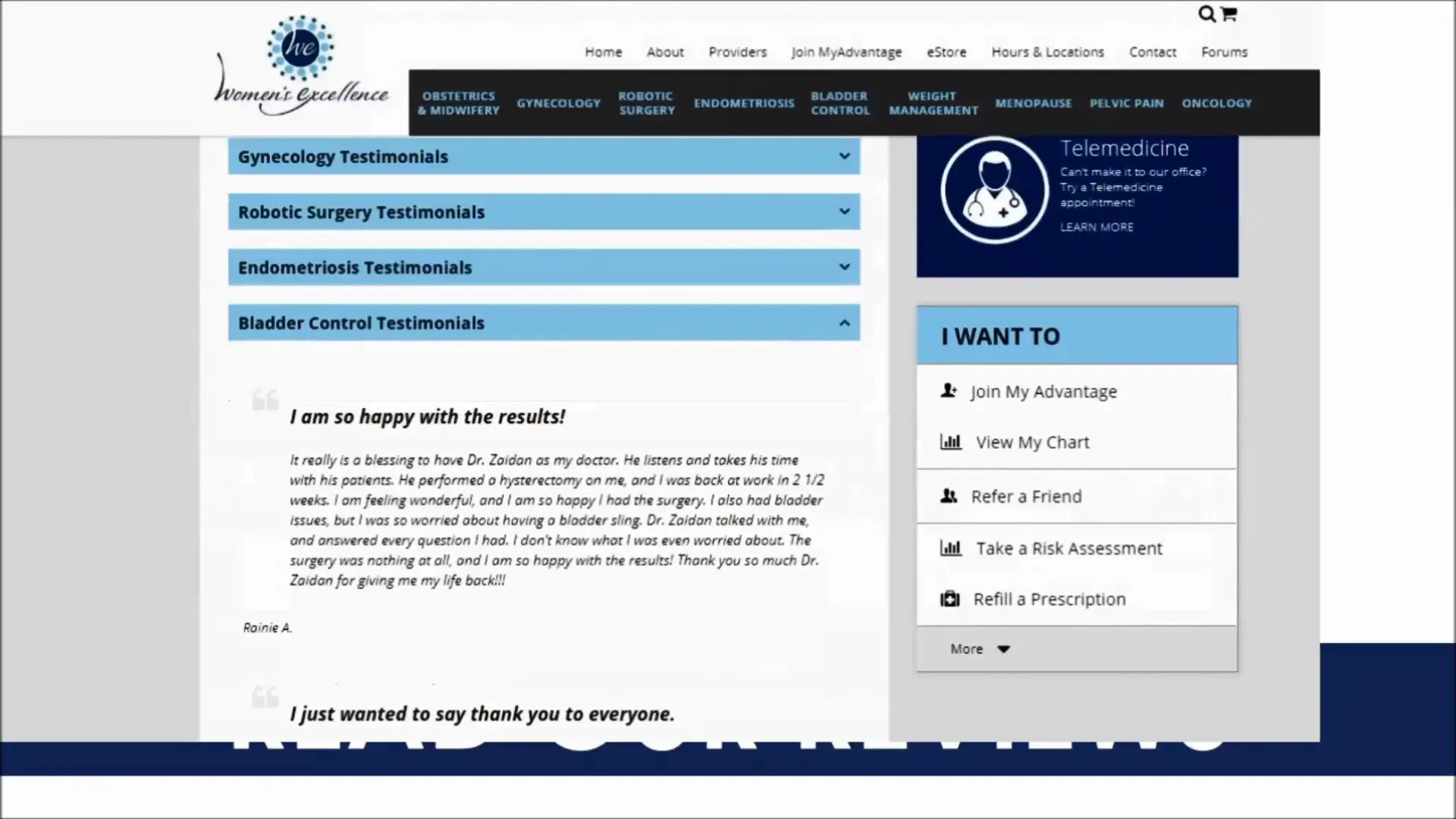Services
Comprehensive Laparoscopic Evaluations
If you have painful intercourse, pelvic pain, or cyclic pain that worsen with each menstrual cycle (called Dysmenorrhea) and these symptoms are not helped by hormonal birth control products or standard non-steroidal pain relievers such as motrin, ibuprofen or naproxen, you may have a problem and the way to diagnose that problem is with an outpatient laparoscopic evaluation. This is a simple outpatient evaluation with a few days recovery that gives us the information we need to treat the problem you have.
Comprehensive Infertility Evaluations
The specialists at Women’s Excellence in Endometriosis understand that many women with endometriosis also have infertility. We understand that a woman may have infertility as a result of undiagnosed Endometriosis. We take infertility evaluations seriously and make sure that we are acting on the inability for you to become pregnant quickly through minimally invasive methods.
Comprehensive Pelvic Pain Management
The specialists at Women’s Excellence in Endometriosis know that pelvic pain maybe mild moderate or severe. Chronic Pelvic Pain (CPP) may or may not involve painful intercourse, may be associated with bladder abnormalities such as Interstitial cystitis, may be associated with vulvar and vaginal diseases such as vulvodynia and vaginismus and also may be associated with Pelvic Floor Muscle Spasm (PFMS). Women’s Excellence in Endometriosis not only understands all of these causes of pain but has also proactively strategically acquired and developed the ability to provide testing, diagnosis and treat all of these causes of a patient’s pain.
Counseling Regarding Infertility Associated with Endometriosis
Many women are confused about their direction with respect to fertility once they have been diagnosed with endometriosis. These women need a treatment plan to not only alleviate symptoms and allow for tolerable intercourse but they also require a comprehensive approach which can help for preservation of fertility and ultimately achieving a pregnancy. The specialists at Women’s Excellence in Endometriosis understand that time is a factor in some of these women and not all women are the same in their needs from the fertility perspective.
Our goal is to identify and treat the cause of your infertility as quickly and conveniently as possible.
Evaluation for Interstitial Cystitis
Interstitial cystitis is felt to be present concomitantly with Endometriosis approximately 40% of the time and the specialists at Women’s Excellence in Endometriosis understands this important relationship. If all aspects of a patient’s problem are not addressed, they will never have a full recovery and improvement of their symptoms. In order to adequately treat a patients symptoms the specialists at Women’s Excellence in Endometriosis believe it is imperative to identify all the individual components to a patients symptoms. For more information, click
HERE.
Evaluation And Treatment Plan For Extensive Endometriosis
Endometriosis is a very complicated disease process that needs a well thought out treatment plan which encompasses a woman’s desire for future fertility, likelihood of problems in menopause, emotional aspects of the potential for loss of feminine organs, pelvic symptomatology and the impact to her life. The specialists at Women’s Excellence in Endometriosis look at all of these factors and then comprehensively develops a customized treatment plan for every woman which may vary depending on the specific characteristics of each woman and their individual needs and desires.
We strive to resect all Endometriosis lesions. If your disease is extensive the best treatment is resection of all of the lesions. This is why we specialize in all the techniques for expert tissue removal. Utilizing a combination of laparoscopy and robotic surgery, we can remove disease in almost all women. We believe that our approach in removing the disease instead of just damaging it is what gives us great outcomes.
Evaluation for Pelvic Floor Muscle Spasm
Pelvic pain may be a result of multiple different etiologies. Endometriosis is clearly not the only cause of pelvic pain and therefore treatment of endometriosis alone with surgical and medicinal therapies is often not enough. Women’s Excellence in Endometriosis believes that chronic pelvic pain may begin as endometriosis but then as a result of chronic inflammation, scarring and pain associated with normal sexual and non sexual activity, pelvic floor muscle spasm may then occur and become a contributing factor to the discomfort.
Hormonal Suppression Techniques
Endometriosis is an estrogen dependent disease process in most cases. Intuitively, the treatment of endometriosis must address the woman’s estrogen production. The specialists at Women’s Excellence in Endometriosis believe that a combination of hormonal estrogen suppression coupled with surgical therapy is paramount to the success in the eradication of endometriosis and the corresponding symptoms that a woman experiences with endometriosis.
Pelvic Floor Muscle Evaluation
Pelvic pain can be a result of many different sources. Pelvic Pain can result from endometriosis, adenomyosis, adhesions from previous inflammatory episodes as a result of surgery or pelvic infection. Pelvic pain can even originate from the bladder in cases of interstitial cystitis. In some cases, pain can be from spasm or significant relaxation of the pelvic floor musculature. That is why we evaluate every patient for relaxation or spasm of the pelvic floor.
Pelvic Floor Muscle Strengthening
We understand that pelvic floor weakness is a severe problem which can result in lack of sensation with intercourse, pelvic organ prolapse and urinary incontinence It can be dealt with mechanically (with surgery) or physiologically (with pelvic floor muscle strengthening). After an adequate assessment of the pelvic floor and vaginal vault, we can determine which method would be best for you and determine whether a mechanical surgical method may be needed along with pelvic floor strengthening.
Vulvodynia
Many patients that have Endometriosis also have other pelvic pain syndromes. Vulvodynia is one of them. We understand the major life altering disorder of vulvodynia. Vulvodynia is defined as excessive pain in the vulvar region and can cause significant physical, sexual, and psychological distress. Vulvar pain can be related to a specific disorder such as infection, inflammation, neoplasm, or neurologic disorders. Vulvodynia refers to vulvar discomfort without an associated secondary cause. The exact cause of vulvodynia in unknown and varies in different patients. The actual diagnosis is often made on the basis of exclusion. At Women’s Excellence, we realize that this problem can be very troublesome to any woman and we take the complaint seriously.
Zoladex Therapy
Zoladex has been prescribed as a treatment for you because likely you have been diagnosed with endometriosis, adenomyosis (fibroid uterus), or menometrorraghia (heavy periods). For more information, please click
HERE.Procedures
Excision of Endometriosis
Endometriosis is an inflammatory disease that continues to grow with the hormones that you naturally produce. If the disease is still present, it has a tendency to regrow. Recurrence of Endometriosis is why we have shifted our treatment modalities to focus on excision of the disease. When we perform excision (remove surgically) Endometriosis, we actually remove the affected area and some of the tissue around it. This alleviates the inflammation and eliminates that area of Endometriosis. Extensive excision of Endometriosis is felt to be the best option to decrease the amount and time for any recurrences. In many cases, a surgical cure can be achieved with the excision method.
Click here for more information about Endometriosis Excision.
Bladder Instillation Treatments For Interstitial Cystitis
Bladder instillation treatments are used to treat the acute symptoms of IC/PBS, otherwise called flares. If you have been newly diagnosed with IC/PBS, we may recommend treatments twice a week for a 6 week period to help relieve your symptoms and jump start your recovery. Bladder instillation treatments are delivered into the bladder through a tiny catheter at Women’s Excellence and take just a few minutes.
da Vinci Robotic Surgery
We specialize in many forms of robotic surgery especially resection of endometriosis in the complicated patient with extensive disease. We are experts at endometriosis resection with robotic technology, teaching other physicians the innovative and state of the art treatment and dissection methods to resect complicated endometriosis.
High Definition Ultrasound
Ultrasonography provides the best, most cost effective and accurate way to identify the pelvic organs without the use of radiation and is used extensively by the specialists at Women’s Excellence to make the most effective diagnosis and treatment plan for your condition.
Hormonal Administration
We are experts at hormonal suppression and have many options to decrease your estrogen balance and gain control of your Endometriosis.
Laparoscopic Surgery
Laparoscopic surgery is defined as a way to enter the abdomen through small incisions and visualize the anatomy. Our specialists at Women’s Excellence in Endometriosis use laparoscopy as a tool to visualize and treat pathology such as endometriomas, ovarian cysts, adhesions and fallopian tube cysts. In some cases we can use laparoscopy to perform hysterectomy as well. With both therapeutic and diagnostic applications, the laparoscope can not only help us make a diagnosis of pelvic pathology and sources of discomfort when ultrasound and other imaging is negative but we can also initiate treatment at the same time by using instruments through small holes called trocars to cut, cauterize and remove pathologic tissue.
Endometriosis is diagnosed surgically by laparoscopy. During laparoscopy, a thin viewing tube (called a laparoscope) is passed through a small incision in the abdomen. A second incision may be made on the lower abdomen to provide an additional opening for surgical instruments. Using the laparoscope, The specialists at Women’s Excellence in Endometriosis can look directly at the outside of the uterus, ovaries, fallopian tubes, and nearby organs. The laparoscope can also be fitted with surgical devices for taking tissue samples/biopsies, removing scar tissue or ablating, fulgurating or cauterizing lesions of endometriosis. The specialists at Women’s Excellence in Endometriosis treat endometrial lesions (implants of endometrial tissue outside of the endometrium) using a high-energy heat source, such as a laser or electrocautery.
LUNA (Laparoscopic Uterine Nerve Ablation)/Pre-sacral Neurectomy
LUNA (Laparoscopic Uterine Nerve Ablation)/Presacral neurectomy may be considered as an alternative to hysterectomy for endometriosis with refractory dysmenorrhea involving midline pelvic pain. The specialists at Women’s Excellence in Endometriosis, however, do not use this approach as first line therapy, in fact, medical therapy should have been attempted prior to surgical intervention.
Pelvic Physical Therapy for Pelvic Floor Muscle Weakness
Our specialists understand that pelvic floor weakness is a severe problem which can result in lack of sensation with intercourse, pelvic organ prolapse and urinary incontinence It can be dealt with mechanically (with surgery) or physiologically (with pelvic floor muscle strengthening). After an adequate assessment of the pelvic floor and vaginal vault, we can determine which method would be best for you and determine whether a mechanical surgical method may be needed along with pelvic floor strengthening.
Pelvic Physical Therapy
The specialists at Women’s Excellence in Endometriosis understand that pelvic pain with can be a result of soft tissue disorders such as pelvic organ prolpase (vaginal cuff or uterovaginal), cystocoele, rectocoele or enterocoele. We know that pelvic pressure may be related to pelvic floor disorders and often occur concomitantly with other disease processes such as endometriosis.
Women’s Excellence offers Pelvic Physical Therapy for the following symptoms:
- Urinary Retention
- Urinary Incontinence
- Pelvic Floor Weakness
- Urinary Frequency/Overactive Bladder
- Urinary Hesitancy or Weak Urine Stream
- Pelvic Organ Prolapse
- Vaginal Introital Spasm/Vaginismus
- Vulvar Pain (Vulvodynia)
- Painful Intercourse (Dyspareunia)
Robotic Lysis Of Adhesions/Pelvic Adhesions Causing Severe Pelvic Pain
We are specialists trained to treat adhesions (otherwise known as scar tissue) that form between the intraperitoneal organs of the body. The cavity that contains the stomach, the bowel and the uterus is called the peritoneal cavity. A woman’s fallopian tubes and ovaries are also within that cavity. Often times if there is an inflammatory process within the abdominal or pelvic cavity, scar tissue can form. The scar tissue that forms is referred to as adhesions. Adhesions can be severe or they can be mild. Mild adhesions cause organs to be connected, but not necessarily fixed to one another. More extensive adhesions can cause organs to be fixed to the organ or structure adjacent to it. In any event, both mild adhesions and extensive adhesions can cause severe pelvic discomfort. They can also cause bowel obstruction, abdominal bloating, and an overall generalized abdominal or pelvic pain. If adhesions are present, whether they have been separated surgically in the past or if they have not been treated previously, the symptoms can be significant. A laparoscope is a device that can visualize the intraperitoneal cavity and often times lyse (cut) adhesions. Although a lysis of adhesions procedure has some risks, including the potential to injure the bowel, bowel injuries are unlikely and happen in few people that undergo laparoscopy. Adhesions that are encountered by laparoscopy can be cut with special minimally invasive scissors and many of the symptoms caused by the presence of adhesions can resolve. There is a chance that adhesions can reform. However, if some adhesions that are causing a woman pelvic discomfort are lysed or cut, the patient may experience significant relief of the discomfort that she has been experiencing. Robotic approaches to lysis of adhesion, especially complex pelvic, bowel or tubal adhesions are available.







